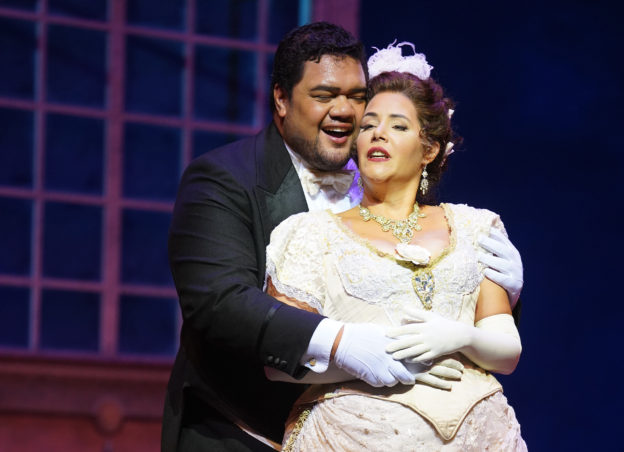
Review: HOT’s ‘La Traviata’ plays at perfect pitch
By Steven Mark, from The Honolulu Star-Advertiser, May 19, 2019
Hawaii-born baritone Quinn Kelsey might have been the main draw for many who went to see Hawaii Opera Theatre’s presentation of “La Traviata” on Friday night at the Blaisdell Concert Hall, and with good reason. When it comes to Verdi baritone roles, he is simply at the top of the game.
But everything else in this production was wonderful as well, from the singing to the acting to the classy conception. This was such a convincing production that it was easy to attach to the emotion of the story, its passion, jealousy, fury and tenderness.
Verdi’s classic is a classic tearjerker: A woman of ill repute, Violetta, meets the man of her dreams, Alfredo Germont, only to have his stuffed-shirt father, Giorgio Germont, try to break them up to protect the family’s honor. Through a series of ill-fated meetings and misunderstandings, all of them are put through a whirlwind of emotion as the story plunges to its inevitably tragic end.
Soprano Danielle Talamantes gave a tour-de-force performance as the “fallen woman” Violetta, with her clear, penetrating and rangy voice sustaining the character throughout. She was fresh and open in the opening party scene, rolling off her “r’s” with a juicy vivaciousness and lending delight and grace to the playful “Sempre Libera” aria.
It seemed that even the stage props were enchanted — at one point, a vase of flowers tilted over as she was belting out a big note.
By Act 2, Talamantes’ Violetta became passionate and vulnerable when she first meets her destiny, and by Act 3, when she is dying of consumption, Talamantes reduced her voice to a trembling vibrato that still permeated the hall with clarity and feeling.
She also had terrific chemistry with tenor Pene Pati as Alfredo, as the two engaged in some serious lip-locking that put the “hot” in HOT.
Pati, the Samoa-born tenor, made an attractive and multidimensional Alfredo. He was slick and charming with Violetta at first, and when he sings a toast at the opening party, it was like Astaire meeting Rogers: One song and you’re mine, baby. Of course, she falls for him.
Things get complicated for Alfredo in the second act. First, he was the romantic, and Pati’s warm, smooth tenor made the grade. But when he learns Violetta is spending all her money supporting their lifestyle, an urgent machismo comes over him that grows to unctuous jealousy later on as Alfredo first tangles with his father and then turns on Violetta herself.
Kelsey was no less compelling as Giorgio Germont. He is a father who wants his daughter to marry into a good family but fears Violetta, with her reputation, will ruin that chance if she continues her relationship with his son. And yet Giorgio is impressed when he meets her and she expresses her sincere love for Alfredo.
Giving his big voice a stern inflection, Kelsey could not be better suited for the role, infusing Giorgio with heart as well as pride. Both come out when he appeals to Violetta not with force, but with gentleness, showing Violetta a picture of his daughter.
All of this drama came with some nice touches. Supertitles have become a kind of necessary evil in opera: The audience needs them to understand the story, but they can be distracting when an aria repeats the lyrics. In this production, when lyrics were repeated, the supertitles were turned off, allowing the audience to sit back and relish the music.
Under the baton of conductor Emily Senturia, the orchestra meshed perfectly with the voices. Where there was crying and sobbing on stage, the phrasing of the strings provided plenty of air. And while Verdi’s score is filled with beautiful, sweeping melodies, there was never a balance problem.
Director Stephanie Havey’s crisp pacing was enhanced by ballet-like choreography, performed to the musical interludes in Verdi’s score. The audience might have been a bit confused in the beginning when two dancers opened the work, performing as Violetta looked on wistfully, but by Act 3, their reappearance made complete sense.
